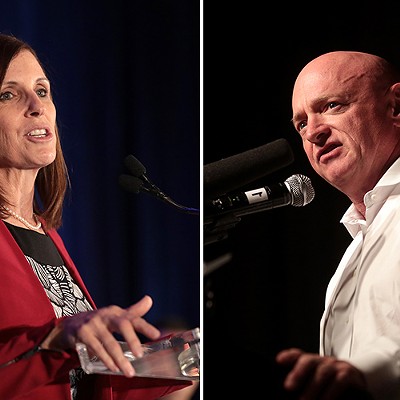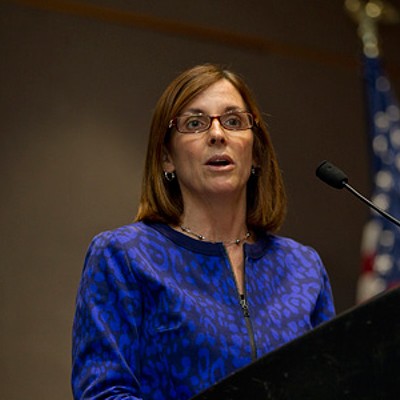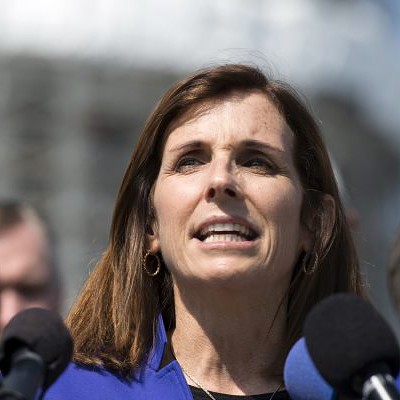Democratic U.S. Rep. Ron Barber and his Republican opponent, Martha McSally, have found an area of agreement: They both think that Mitt Romney's now-infamous comment about the "47 percent" was the wrong thing to say.
"I'm focused on my race right now, so I'm not going to get into the ins and outs of the presidential debate, but obviously, what he said was inappropriate," said McSally, a former Air Force combat pilot who returned to Tucson after leaving a teaching job in Europe earlier this year to seek a congressional seat in the wake of Gabrielle Giffords' resignation.
Barber, who won Giffords' seat in a June special election and is now seeking a full term, said that anyone who suggests that 47 percent of Americans pay no taxes is "really detached from the reality of who that 47 percent is."
Romney made the remarks at a May fundraiser that was captured on video and widely distributed last week by Mother Jones magazine. Responding to a question about how he could close the gap with President Barack Obama, Romney said that Obama enjoyed the support of 47 percent of the voters. He then conflated Obama's supporters with the 47 percent of Americans who do not pay income tax—a dubious link, according to federal statistics about who pays taxes—and, in reference to those people, said that he could "never convince them that they should take personal responsibility and care for their lives."
Barber called Romney's comments "another example of people running for office who are really hostile to middle-class Americans and people who are out of work. He seems to have no real sense of what's really going on."
Barber notes that the 47 percent of people who don't pay federal income tax still pay a lot of other taxes. For example, 28 percent of them are employed, so they pay payroll taxes (i.e., Social Security and Medicare taxes). And most pay local sales taxes and other taxes.
Another 10 percent are elderly people who have retired and don't earn enough to pay taxes.
"My uncle, for example, gets $900 a month from Social Security," Barber says. "He doesn't have to pay taxes on that. He barely gets by on that. So we're talking about people who are really struggling, and who in many cases do pay taxes. Certainly, they're not people who are expecting government to do everything for them. Many of them are trying to get back to work."
Some Republicans have been critical of Romney's statement, because GOP policies have been the driving force behind allowing 47 percent of Americans to pay no income taxes. But some conservative pundits have praised Romney for speaking bluntly about the fact that 47 percent of Americans don't pay income taxes and, in the words of more than one Republican, don't have "skin in the game."
On whether it's appropriate for so many Americans not to pay federal income taxes, McSally said the nation needs to have a conversation about those policies.
She said she supports "real tax reform that brings the complexity down, makes it simpler (and) keeps taxes as low as possible and as inclusive as possible. So whatever that right number is, (so that) people are paying, symbolically, some level of tax—whether it's appropriate or not is certainly worth having a discussion in a bipartisan way."
The issue highlighted a key difference between Barber and McSally on fiscal policy: McSally supports extending the Bush tax cuts for all Americans.
"I am not for raising taxes on anyone in the economic situation that we're in," McSally said. "I don't think it's smart to be doing that."
McSally said she'd prefer to focus on cutting government spending rather than raising taxes to balance the federal budget.
Barber recently voted in favor of a Democratic budget plan that would extend the Bush tax cuts for people who earn less than $250,000 a year, but would have those who earn more than a quarter-million dollars in adjusted gross income return to the rates they paid under the Clinton administration.
"I supported the tax cuts continuing for middle-class Americans, and I felt that people at the top of the income bracket—people making $250,000 or more—could pay a little bit more into the system to help us right the fiscal situation that we've got," he said.
In a separate development in the Congressional District 2 race, McSally seized on comments that Barber made in an interview with the Arizona Daily Star about Republican congressmen being "essentially a bunch of white guys" who represent "big-money" interests.
Of the 287 Republican members of Congress, 13 are ethnic minorities, while 29 are female.
McSally called Barber's comments "sad."
"Ron Barber's comments reflect the tone of Washington politicians, where name-calling has become sport," McSally said in a press release. "Name-calling and stereotypes never created a job or helped a struggling family."
McSally's campaign manager, Bruce Harvie, added that Barber "is incapable of providing real leadership or solutions, so he just hurls partisan attacks at Republicans. No wonder he has been so ineffective in Washington."
Barber campaign spokesman Mark Prentice said via email that Barber "referred specifically to the Republican leaders in Congress, not to people in Southern Arizona. Ron said that he is a Democrat because he believes in looking out for the middle class. The Democratic Party represents all of America, and has been a strong voice for all Americans: homeless veterans, seniors struggling to make ends meet, and our middle class that is slowly disappearing."
Prentice noted that the three bills Barber has introduced had Republican co-sponsors.
"Bipartisanship is important to Ron, and he will continue working with all members of the House, regardless of party affiliation," Prentice said.

















